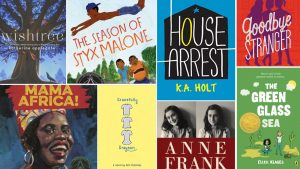The place Is All of the Unhappy Boy Literature?

Recently, it looks as if literary fiction has been unable to flee the scourge of “unhappy woman literature.” Although the style has deep roots, it garnered widespread reputation in the course of the pandemic, when it got here to encapsulate the malaise of millennial and Gen Z existence: unfulfilled needs, life underneath late-stage capitalism, the specter of local weather change, and so forth. So prolific is the style that it now appears to have flattened the branding of latest girls’s fiction into one thing of a monolith. This isn’t to say that these novels are with out advantage—removed from it!—however the best way they’ve been marketed speaks of an trade stunted by the recognition of its personal creation.
The place are all of the unhappy younger males in literature, then? The male equal of My 12 months of Relaxation and Leisure’s droll narrator? The trendy-day Holden Caulfields? So far as the Web is basically involved, there aren’t any. Or at the least only a few of them obtain the identical hype as books by and about girls. Maybe it’s as a result of there’s a sure stigma surrounding male vulnerability, however in modern fiction, the topic is wildly missed. This discrepancy isn’t only a matter of illustration, although: It’s reflective of wider attitudes towards masculinity. If social norms dictate that males ought to embody power and stoicism, there’s little house left for individuals who don’t. Finally, fiction performs a vital function in shaping our self-image and actuality; it’s why the relative absence of younger males in current fiction profoundly impacts how we understand and perceive the emotional lives of males extra broadly.
Regular Individuals’s Connell Waldron is probably the uncommon exception. Within the 4 years since Hulu’s TV adaptation first aired, TikTok edits of Paul Mescal—spliced with excerpts from Sally Rooney’s novel—are nonetheless as standard as ever, little doubt aided by the meteoric rise of his appearing profession. And although Connell is probably not as acerbically self-aware as Frances from Conversations with Pals or Alice from Stunning World, The place Are You?, he arguably stands as essentially the most fascinating of Rooney’s protagonists. We see him wrestle to speak how he feels, however not for a scarcity of feeling or skill to articulate himself. His emotional reticence is as a substitute a product of Eire’s masculinity disaster, Rooney advised Esquire UK, caught as he’s between looking for the approval of his mates and eager to be individual. By way of Connell, readers expertise Rooney’s most lucid and shifting writing—it’s little shock, then, that she felt compelled to return to male protagonists in her upcoming novel, Intermezzo.
However despite the fact that Connell affords a powerful instance of a (generally) unhappy younger man in literature, Rooney is a feminine author. It’s not essentially that writers ought to limit themselves to writing views that resemble their very own (if this have been the case, fiction could be in a dire state proper now), it’s that Rooney demonstrates one other downside with the panorama of contemporary fiction: Younger males look like manifestly absent from the modern canon of standard authors writing about intercourse and intimacy.
For the previous couple years, different writers have requested why this could be the case. Novelist and journalist Imogen Knights-West flagged the dearth of straight males writing private items about relationships final yr, pointing to the “hostile reception” that this sort of work would possible obtain. For girls, traditionally the “underdogs” in terms of heterosexual relationship, she suggests that there’s a distinctive catharsis in studying and writing about different girls’s romantic tragedies. Not lengthy earlier than that, guide critic Barry Pierce requested the place all of the younger male writers had gone. “The actual fact there is no such thing as a main UK or Irish male novelist, no family title, aged between twenty-five and thirty-five for the time being is immensely unusual,” he wrote. Ocean Vuong, now thirty-five, could be the closest the U.S. has to this proper now—although he’s arguably higher often known as a poet than as a novelist.
Might that be about to alter? Dredheza Maloku, an editor for Daunt Books Publishing, says that she’s been “receiving thrilling work by younger male authors on submission, most of the time with a coming-of-age slant.” Nonetheless, she will additionally see how the market seems to be prefer it’s saturated with feminine voices. “I do suppose we’re slowly however absolutely popping out of the inflow of those books triggered by the success of Sally Rooney,” Maloku says.
The proliferation of queer fiction in recent times owes a lot to the lasting affect of André Aciman’s 2007 novel, Name Me by Your Title. This seminal work stays probably the most beloved queer bildungsromans, chronicling the tender and tumultuous romance between seventeen-year-old Elio Perlman and twenty-four-year-old Oliver, a visiting doctoral pupil enlisted to help Elio’s father with numerous tutorial duties. Critics disagree as as to if Aciman’s novel needs to be thought-about a bildungsroman or a queer romance. Both method, its lyrical prose and shut grasp of the narrator’s psyche make for a gratifyingly intimate learn. As Elio recounts a halcyon summer time in Nineteen Eighties Northern Italy, we see the younger males sunbathing, swimming, biking, and stepping into heated mental debates. Regardless of the idyllic setting, there’s an underlying disappointment to Elio’s narration, as he is aware of that his time with Oliver is fleeting—we see him counting down the “six weeks and in the future” till Oliver leaves. Above all, Name Me by Your Title is a novel about need unfulfilled, and it’s in these tender gestures, shifting between the sexually implicit and express, that the eroticism between Oliver and Elio feels most palpable. Aciman captures the fraught needs of adolescence with an acute specificity: that must need and be needed, to lengthy and to lose.
Within the seventeen years since Name Me by Your Title’s launch, the topic of the age hole between Oliver and Elio has dominated discourse across the guide. Accusations of exploitation are rife, as is a basic refusal of the concept that their relationship will be labeled as a romance underneath these phrases. However at no level did Aciman advocate for his novel to be an educational love story, and it’s precisely this moral murkiness that makes Name Me by Your Title so attention-grabbing within the first place.
Writing alongside comparable traces, Adam Mars-Jones chronicles the romance between bikers Ray and Colin, starting on Colin’s eighteenth birthday, in Field Hill. Winner of the 2019 Fitzcarraldo Editions Novel Prize, Mars-Jones flexes his literary prowess in a narrative that’s tightly managed, even with a meandering, chatty narrator. Like Aciman, he makes the case for the complexities of early love. Abuse, intimacy, degradation, and tenderness coexist in a relationship spanning 128 pages and twenty-five years, with Colin insisting all through that “Ray was good to me—he was.”
Though Name Me by Your Title and Field Hill discover the intersections of age, energy, and same-sex need between males, neither falls into morally didactic territory. Equally, in Brandon Taylor’s novels, the author resists crafting superficially “good” characters to recommend they’re worthy of being handled properly. His most up-to-date guide, The Late People, sees a rotating solid of grad college students coupling up, dishonest, combating, and getting again collectively. It’s a smorgasbord of horrible folks, however Taylor’s sardonic wit prevents issues from getting too bleak. (“Ekphrasis is so useless, man,” says poet Seamus after getting kicked out of sophistication for mocking the work of his friends, all of whom are girls.) On the opposite finish of the spectrum, Douglas Stuart’s Younger Mungo reveals how centuries of sectarian violence play out in a love story between two younger males. The poverty, parental neglect, and abuse make for a harrowing learn, one actually a lot darker than any of the opposite novels.
There’s no lack in any way of novels by cis queer males. However the place tales of transmasculinity are involved, there’s a stark scarcity. Many of the texts I got here throughout, like Paul B. Preciado’s Can the Monster Converse? and Jack Halberstam’s Feminine Masculinity, approached the topic by means of autotheory, mixing memoir and important idea, and different modes of nonfiction. On this sense, Griffin Hansbury’s Some Unusual Music Attracts Me In stands out as an exception, telling the story of Max (previously Mel) wanting again on his adolescence. Over the course of the novel, Max involves phrases along with his expertise of getting lived as a lady whereas failing to dwell as much as societal expectations of normative femininity. After I spoke to Hansbury about males and masculinity in publishing, he advised me, “I’m troubled by the just about complete absence of transmasculine tales. We now have an extended historical past of being unimaginable, illegible, and unmirrored by the world. Individuals like me are nonetheless largely unwritten and unpublished, with a couple of notable exceptions.”
As for as we speak’s male writers, Hansbury says, “If younger male writers wish to inform a distinct story about masculinity, one which grapples with interiority and all of the horrors and wonders of dwelling in a weak, penetrable human physique in society, then sure, there’s a cultural necessity for that type of story. It’s going to be a tragic story, as a result of to be human is to undergo, after which, hopefully, to make which means from that struggling. As writers, we ideally supply that which means to others, to assist them make their method in a world that’s typically troublesome to bear.”
So appears to be the case with a lot of the queer literature I’ve surveyed to date, however what in regards to the unhappy younger straight males? In an trade they’ve lengthy dominated, do we actually want extra books about them? As a younger lady, I’d say so. The epidemic of male suicide speaks volumes of a tradition that frames masculinity as unyielding and resistant to vulnerability. Fiction can supply a helpful lens into that headspace, as an avenue by which we perceive the lived experiences of others.
I’m not alone in my starvation to learn extra of those views. “As a girl, I’m discovering myself eager to learn extra novels from a younger male perspective, particularly in the event that they’re exploring tales of diaspora or concerning vulnerabilities in new and thrilling methods,” Maloku says. “There’s an urge for food for these tales for positive, and the query now’s about discovering these voices. In a world that feels progressively extra fractured and unsure, are extra younger males turning to fiction to satisfy themselves on the web page? Is that this, in flip, fueling this urge for food for extra young-men-coming-of-age tales? Like every literature, the cultural worth is to generate empathy and to create an area of understanding between reader and author.”
After I spoke to numerous editors and writers, the subject of vulnerability cropped up time and again. Whereas girls are given credence to inform their tales and write about their ache, males are hardly ever provided the identical outlet. It is smart why there are fewer John Updikes and Charles Bukowskis round as we speak, provided that the literary world was so lengthy dominated by males of that ilk—but when not by means of fiction, the place else can males really feel seen and understood?
Many have pointed to “the manosphere” as one of many primary locations the place this would possibly occur. By way of the veil of anonymity, websites like 4chan give males a spot to speak about their emotions at a time when conventional notions of masculinity really feel threatened. Consisting of on-line platforms propagating misogynistic and anti-feminist pondering, the manosphere can also be broadly credited for bolstering the recognition of incel ideology, Andrew Tate, and, in fact, Donald Trump.
Ben Lerner’s 2019 novel, The Topeka College, seeks to make sense of this masculinity disaster throughout generations. Returning to his autofiction alter ego, Adam Gordon, Lerner delves into the complexities of contemporary masculinity in opposition to the backdrop of 1996 Kansas, the place he attracts hanging parallels to the cultural aftermath of Trump’s presidential tenure. Whereas the interrogation of language—its prospects and its shortcomings—is nothing new for Lerner, it’s the primary time his fiction reveals its potential as a severe weapon. Adam tells us that he desires of changing into a poet “as a result of poems have been spells, have been formed sound unmaking and remaking sense that inflicted and repelled violence and made you famend.” In the meantime, Adam’s classmate Darren Eberhard is radicalized; he transforms from a sympathetic and remoted determine into an archetype of reactionary white masculinity, in addition to a gun-toting member of the Westboro Baptist Church. As an grownup, Adam encounters Darren sporting a MAGA hat. He observes that Darren is “heavier than the final time [he] noticed him, bearded, nearly actually armed.”
If The Topeka College makes something evident, it’s the shut relationship between radicalization, masculinity, and political rhetoric. At instances, Lerner even means that language itself has been exhausted of risk: “This language has reached its restrict,” Adam’s mom says. “A brand new one will likely be constructed. Sima and I’ll construct it.” As a aggressive debater, Adam carefully observes his opponents, using a method known as “the unfold,” through which arguments are introduced in such fast succession that they’re nearly not possible to answer. “It’s not that the viewers actually learns something about these folks or occasions,” he explains. “It’s about how naturally these overseas signifiers roll off {the teenager}’s tongue.”
It could be tempting to learn The Topeka College as foreboding of a nightmarish future, however woven into this story of psychoanalysis and radicalization can also be the promise of one thing higher. Somewhat than abandon hope, Lerner encourages us to show to these smaller, incremental acts of speech that carry us collectively. Moments like these abound all through the novel, from Adam’s musings on the marvel of poetry to his present-day self singing at an ICE protest along with his spouse and daughters. Lerner reveals us not solely the ability of language for good but in addition the novel’s energy as a instrument of empathy.
Lerner, nevertheless, is not a younger man. Aciman, Mars-Jones, and Stuart aren’t, both. However in my seek for younger male novelists writing coming-of-age tales, the names of two writers got here up time and again: Michael Magee and Caleb Azumah Nelson.
In Near Dwelling, Belfast native Magee delivers a profoundly humane narrative that confronts the systemic challenges of sophistication and belonging in a society marked by financial collapse and the lingering results of Eire’s Troubles. In a stark tonal distinction, Azumah Nelson’s debut novel, Open Water, intricately weaves a love story between a photographer and a dancer in opposition to a backdrop of Black exuberance and creative expression, exploring their challenges and emotional depth. These books sort out the fissures of the UK’s uneasy sociocultural historical past in very other ways, however the place craft is worried, Magee and Azumah Nelson each excel.
Like Open Water, Bryan Washington’s Memorial forensically examines the aftermath of colonial violence in on a regular basis life. Set in Houston’s Third Ward, the novel depicts the fractured relationship between Benson, a middle-class Black man, and Mike, a Japanese American chef. Each males are caught between the previous, current, and future, essentially unable to flee the systemic forces—race, class, sexuality—that form who they’re. Washington handles his topics with severe care and empathy, recognizing that it’s solely by shifting viewpoints and briefly relinquishing our personal that we will see the world from a brand new perspective. Right here, Magee, Azumah Nelson, and Washington really feel like premonitions of an thrilling new wave of younger male writers. It’s for this very motive that we’d like extra of them: as a result of what we learn can change the best way we see ourselves, different folks, and the world round us.
However that concept doesn’t at all times end in optimistic perceptions. Take into account male readers of David Foster Wallace, Haruki Murakami, and, to a lesser diploma, Thomas Pynchon. By no fault of their very own, these writers have earned reputations because the apex of white male pretension; as we speak, their books have acquired cult standing as signifiers of misogyny. This appears to be very true of Wallace’s Infinite Jest, a guide so infamous that even those that haven’t learn it nonetheless really feel entitled to make snap judgments in regards to the sorts of males who’ve.
It’s straightforward to argue that this sort of pondering is a product of performative studying on social media. Though the gargantuan reputation of #BookTok would possibly recommend that literary consumerism and its co-option as a instrument of private branding is a brand new phenomenon, the connection between studying and id has been round for hundreds of years. Literary historian Stephen Greenblatt proposes that masculine “self-fashioning” by way of fiction studying was so ample within the early fashionable interval that society deemed it elementary to the development of a perfect masculinity and public persona. As fiction turned extra intertwined with its social, political, and cultural context, selfhood more and more emerged as a product of literature, forging a reciprocal relationship between the 2.
If not by means of fiction, what other forms of media consumption are younger males utilizing to style themselves as we speak? Jamie Cameron, managing editor of literary and humanities periodical The London Journal, affords a idea: “Publishing has usually been dominated by cis, straight, white males who used to publish these kinds of coming-of-age tales on a regular basis,” he says. “It was an oversaturated marketplace for positive, however now the issue is that issues angled towards males are all geared towards self-improvement, not vulnerability.”
Cameron goes on to say: “That’s supposedly the entire attraction of figures like Andrew Tate, as they consistently put the onus again on being extra masculine and making extra money, and what it’s that you just, as a person, are failing to do. Many of the literature I see marketed towards males nowadays isn’t fiction, nevertheless it’s books alongside these traces. As a substitute, it’s all books by Jordan Peterson, Steven Bartlett, and Elon Musk. That’s the place the massive downside is, I believe, in that there’s no mainstream literary framework for masculinity to exist outdoors of this model of aggressive neoliberalism. If that’s not what younger males aspire to, what’s the different?”
Cameron raises a compelling query. This additionally reveals why coming-of-age novels written by and about younger males have solely grow to be extra obligatory all through the years. As for the query of whether or not there’s house for them, Maloku insists there’s. “If there’s an urge for food for these books, then the publishing trade will search them out and publish them,” she says. “The true query is, are males being extra weak than they was once, or are we simply extra enthusiastic about these tales now as a result of readers are bored of the identical tales written by the identical varieties of individuals?”
Regardless of the reply could also be, there’s clearly an urge for food for extra various narratives in literary fiction. Certainly, the books I’ve mentioned present promise of an trade evolving into one thing fully new. Gone are the times when solely sure voices have been entrance and middle; now the brand new canon of male writers consists of voices which might be queer, Black, trans, and past. As I contemplate what literary masculinity would possibly imply as we speak, I’m struck by one thing Hansbury stated to me: “If masculinity is threatened, hopefully it’s the previous masculinity of extraction, violence, and domination.” I couldn’t agree extra.
Prop styling by Miako Katoh











